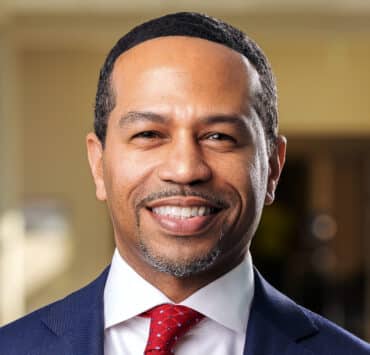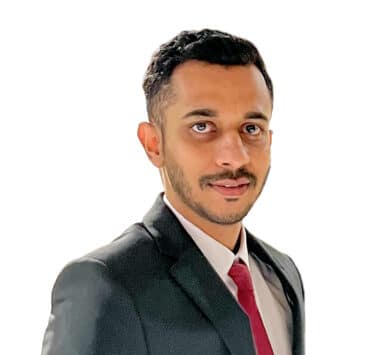Suja Subramaniam has a key and prominent role at the world’s largest biotech company. She joined Roche Diagnostics nearly two decades ago, and as head of intellectual property (IP), she provides the competitive intelligence, cross-functional leadership, and strategic legal counseling that protect the business as its employees develop tools and products that improve the way scientists and physicians diagnose, prevent, and treat disease.
The journey to the top of a leading pharmaceutical and biotech company with nearly $60 billion in annual revenue was a long one. Subramaniam was born in India and raised in a middle-class New Delhi family. “There wasn’t too much change or adventure in my life as a teenager,” she recalls.
Subramaniam first pursued an undergraduate degree in chemistry. Her parents wanted her to become a physician, but a computer science course put her on a new and unexpected path. She was one of three girls in a class of twenty-five students learning to program, and she finally found the excitement that she was looking for.
Subramaniam was looking for a way to combine her interests in chemistry and computing. A love for science and a desire to be in the lab motivated her, and she targeted a PhD program that would lead to a position in research and development for a leading institution. But all of that changed when Subramaniam got some news—an unexpected personal situation that led her to choose a different career path away from the laboratory.
“We are innovating in healthcare and patents are one of the ways we share that innovation with the world.”
Suja Subramaniam
As the young student evaluated her options, law school emerged as a match for her skills. “Legal matters are like science experiments where the variables are case law and precedents,” she says. Subramaniam received a full fellowship to Notre Dame and was soon in South Bend, Indiana, where she experienced snow and American culture for the first time.
Upon graduation, Subramaniam earned a master’s degree in intellectual property and later started working for a law firm in Michigan where she learned how to draft patent applications and “convert technology into something people can use.” After nearly four years, Subramaniam had become a skilled patent attorney—but she missed chemistry and the excitement of innovation. She started looking for an in-house opportunity that would allow her to interact with scientists.
Subramaniam found that opportunity in 2003 and joined Roche as a patent attorney. She later led a patent department in Switzerland and was head of Roche Diagnostics’ legal department in India. She was promoted to her current leadership role in 2021.
As a former scientist, Subramaniam feels an extra responsibility to do her job well because Roche produces tests and instruments that diagnose everything from cardiac failure to HIV. “We are innovating in healthcare and patents are one of the ways we show that innovation to the world,” she says. “Our scientists are working hard behind the scenes on cutting edge technologies, and when my team files patents for their innovation, we introduce them to the public.”
“I’ve learned to speak up as a woman and an ethnic minority because if I don’t, there is nobody else to offer my perspective.”
Suja Subramaniam
In the past ten years, Roche Diagnostics has made significant investments, including a series of acquisitions in cutting-edge technologies, including personalized cancer diagnosis, gene sequencing, and data insights.
Subramaniam’s teams helped build and protect patent portfolios including for these acquisitions, and the deals have resulted in tangible benefits to patients including her own mother, who was diagnosed with breast cancer. In 2019, Roche introduced the first novel test to identify triple negative breast cancer patients for immunotherapy. Using these and other Roche tests that empower precise diagnosis, oncologists can determine which patients will benefit from specific treatments and therapies that dramatically reduce mortality rates.
At Roche, a deep commitment to research brings positive outcomes that improve and save patients’ lives. In 2021, the company launched four new diagnostic tools for diabetes care, introduced six new tests for infectious and cardiovascular diseases, and created twenty-two new assays in oncology.
Subramaniam is working to create valuable assets for Roche as the company adjusts to changes in consumer behavior and healthcare. She compares investing in innovation and IP to planting fruit trees: in both cases, the benefits are reaped by future generations. “As an IP attorney, we need to help the business see this long-term benefit,” she says.
COVID-19 has changed everything and opened up new opportunities. In 2020, Roche started manufacturing and selling at-home testing kits and now has twenty-two tests and solutions in its COVID portfolio. In fact, the company’s innovations enable more than sixty million coronavirus tests per month.
Ten years ago, Roche’s work went straight from its big labs to hospitals. Now, Subramaniam is working to partner with the company to expand home kits for testing other illnesses and diseases. “COVID-19 is changing healthcare, and we are going to see more tools for sample collection and other diagnostic tests shipped directly to patients. Business and revenue streams are shifting, and IP can partner with business to drive the change,” Subramaniam explains.
In addition to managing IP teams, Subramaniam helps lead Roche Women in Leadership group and advocate for diversity. “I’ve learned to speak up as a woman and ethnic minority because if I don’t, there is nobody else to offer my perspective,” she says, adding that the outlook for women in the industry and world is improving.
Suja Subramaniam is inspired by her own daughters’ ability to confront bias, and likes to think that she has inspired the next generation to consider nontraditional leadership roles that impact the world and bring positive outcomes to healthcare.
WilmerHale:
“Suja is an incredibly talented lawyer who is able to align her department’s work with the company’s core strategic priorities all while navigating complex legal issues. We greatly value our work together.”
—Bob Gunther, Partner


